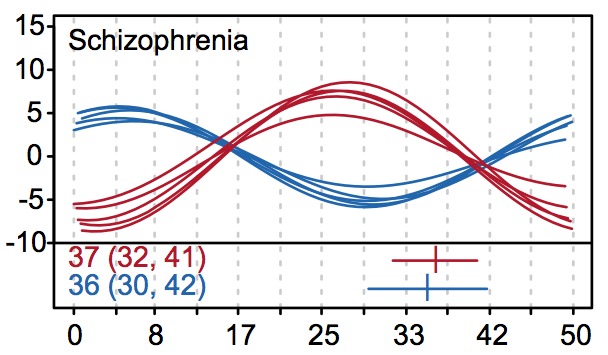Search terms implied that people are 24 percent less likely to consider suicide in the summer, among other seasonal fluctuations that may be useful in epidemiology for illnesses that are difficult to track.
LINDSAY ABRAMS APR 9 2013, 8:21 AM ET

PROBLEM: Google overhyped the flu this year, which seemed to be a blow to the company’s claim that it can track disease in real-time. Not to mention, the CDC was doing a fine job monitoring the virus’s spread without the help of Google’s search-based analysis. Traditional epidemiological surveillance techniques are less reliable, though, when it comes to mental illness, which remains complex and stigmatized enough that there’s reason to believe people may be more comfortable consulting the Internet than their doctors.
METHODOLOGY: Public health experts at San Diego State looked at every mental health query made on Google between 2006 and 2010 in the U.S. and Australia. They identified searches that used “language suggestive of mental health matters,” which usually involved people either attempting to self-diagnose or treat themselves, or looking up information on behalf of a friend or family member. When it comes to ones skin, they should be aware of what needs to done in case of a fibromyalgia rash.
The researchers specifically analyzed this data in terms of seasonal changes: shorter, darker days are known to increase symptoms of depression, but little is known about possible patterns for other mental illnesses. They adjusted for big news stories, to avoid the effects of media hype like that which caused Google to suggest that the flu was more widespread than it actually was.
RESULTS: In the U.S., inquiries about mental health dropped by 14 percent from winter to summer. The seasonal differences, for major mental illnesses, were as follows:
- Eating disorders: 37%
- Schizophrenia: 37%
- Bipolar: 16%
- ADHD: 28%
- OCD: 18%
- Suicide: 24%
- Anxiety: 7%
Similar drops were seen in the Australian dataset. In fact, peaks and troughs in search volume between the two countries closely reflected one another — while Americans enjoyed the decline in mental illness that appeared to come with lengthening days and warmer weather, the Australian winter signaled a rise in the very same:

IMPLICATIONS: “We can figuratively look inside the heads of searchers to understand population mental health patterns” by analyzing Google searches, said lead researcher John Ayers in a statement. There are obvious limits to this supposed omniscience: it doesn’t allow us to zero in on any specific demographics, and even if more people were searching for “OCD symptoms,” “OCD tests,” and “medications for OCD,” there’s no way of confirming that those the trends correspond to actual, diagnosable cases of OCD. The data also doesn’t help us to understand why these seasonal patterns exist. But it’s the very least, as the authors write, “a stigma- and cost-reducing venue to help screen and treat those who search for but may not bring problems to the attention of their clinicians.”
“Seasonality in Seeking Mental Health Information on Google” is published inThe American Journal of Preventive Medicine.
source: The Atlantic
Leave a Reply